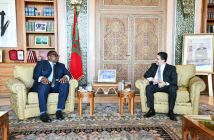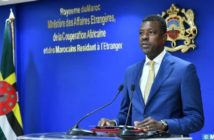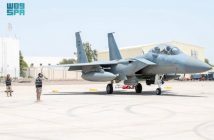[tentblogger-youtube Glyxo1_KDGI]
The new Suez Canal in progress
Egypt launched digging of a second Suez Canal which will run in parallel to the actual canal.
The enlarged canal will allow ships to sail to both directions in the same time over much of the canal’s length. This will decrease waiting hours from 18 to 11 hours for most ships and it can double the capacity of the Suez Canal from 49 to 97 ships a day. Last year, 16,600 ships passed through the Canal.
The New Suez Canal works are expected to be 72 km long – this will involve 35 km of dry digging and 37 kmof “expansion and deep digging” where the whole canal is 164 km long.
The chairman of the Suez Canal authority announced that the revenues from the Suez Canal will jump from 5 billion dollars to 12.5 billion dollars annually.
These revenues will be used to transform the cities along the Canal (Ismallia, Suez, and Port Said) into international trading centers. Many new projects in the Suez province are being studied as a result of building of the New Suez Canal, such as the building of glass factories, cement factories, and fish farms, and the completion of the valley of technology.
Funding the project
Now who will pay the cost and who will implement it.
The project costs around 60 billion Egyptian pounds (US$ 8.4 billion) 30 billion Egyptian pounds will be for digging the new canal and the other 30 billion will be for building 7 new tunnels in Ports Said and Ismailia to connect the Sinai peninsula to the Egyptian homeland.
Who will fund this project? Only Egyptians are allowed to fund it by buying 5-year Suez Canal Investment certificates with a 12 percent interest rate and quarterly dividends.
Who will execute the project? Egyptian contractors under the control and supervision of the Egyptian army acting as the American Corps of Engineers.
We are now on the fifth day of the people’s funding participation and guess what? 27 billion Egyptian pounds (3.8 billion dollars) had been paid so far in the first four days which equal to 45% of the targeted amount.
Who is trying to stop this project? The Muslim Brotherhood. In the first day, a complete blackout hit Egypt to prevent the Egyptians from participating in this national project as they used to do during the elections. Actually 1000 employees in the Electricity sector are under investigation for belonging to a terrorist organization.
In fact, we will not believe that the Americans are fighting against terrorism until they recognize the Muslim Brotherhood as a terrorist organization. The Americans use and abuse the terrorists to achieve their strategies but they are not really concerned about ending their influence. The prove is that Egypt is more than one year fighting against terrorism to the neck and the 10 Apache helicopters are still parking in the American bases.
In this video we can see some Egyptians who bought these certificates and are giving their comment:
– I came with enthusiasm to do something for the country, for the love of my country and my president who protected us.
– University professor: This project is good and it restored the youth confidence. It’s a national project in which you can participate to build your country, to love it. It’s a project which restores the national belonging and the loyalty. I hope that the coming projects will follow the same line. It’s really a brilliant idea.
– I wished to pay 150.000 LE but I could not afford more than 150 LE.
– I am participating because the interest rate is high.
– My wife and I will buy. She encouraged me.
Presenting the project
A quick project presentation in English language
A more detailed presentation in Arabic language
Digging work in Suez Canal site
Euronews coverage in English
Caterpillar machines on their way to Suez Canal site
A national feast
So, it’s a national feast for the Egyptians. Many people go to watch with their eyes the execution of this miracle.
Many artists and singers organize celebrations almost every week on site:
Ghada Ragab sings “Teslam el Ayady”
Ghada sings another song: Ahlef besamaha we trabha
Suez Canal History and Ferdinand De Lesseps
In 1854 and 1856 Ferdinand de Lesseps obtained a concession from Sa’id Pasha, the Khedive of Egypt andSudan, to create a company to construct a canal open to ships of all nations.
The excavation took some 10 years using forced labor (corvée) of Egyptian workers. Some sources estimate that over 30,000 people were working on the canal at any given period, that more than 1.5 million people from various countries were employed, and that thousands of laborers died.
The British government had opposed the project from the outset to its completion. As one of the diplomatic moves against the canal, it disapproved of the use of “slave labor” of forced workers. The British Empire was the major global naval force and officially condemned the forced work and sent armed Bedouins to start a revolt among workers.
The canal opened on 17 November 1869.
Israel
After the creation of Israel in 1948, the East coast of the Suez Canal had been occupied by Israel in 1956 and 1967-1975.
Qatar
Qatar who is buying everything in the world (ask the French people about this issue) had an intention to buy the Suez Canal and to start all this development work. But the Egyptian people who put an end to the Muslim Brotherhood succeeded to wake the Qatari Emir from his dreams and are taking the whole business on their own.
Walt Whitman poem
In 1869, Walt Whitman (American poet, 1819 – 1892) celebrated the scientific achievements that made Suez Canal possible. He demonstrated his excitement and admiration and started his poem by attributing the canal to both science (“proud truths of the world”) and myth (“and fables of eld”):
Passage O soul to India!
Eclaircise the myths Asiatic, the primitive fables.
Not you alone, proud truths of the world!
Nor you alone, ye facts of modern science!
But myths and fables of eld—Asia’s, Africa’s fables
The far-darting beams of the spirit, the unloos’d dreams,
The deep diving bibles and legends,
The daring plots of the poets, the elder religions;
Sono cominciati i lavori per il raddoppio del Canale di Suez, un’opera da 8,4 billion di dollari tutta finanziata dagli egiziani che stanno comprando i bond emessi dallo stato. L’ entusiamo è grande tra la popolazione che crede in questo progetto che sarà volano di sviluppo per il paese.
In progress il nuovo Canale di Suez
L’Egitto ha cominciato i lavori di scavo del secondo Canale di Suez che correrà in parallelo a quello attuale. Il canale allargato consentirà alle imbarcazioni di navigare in entrambe le direzioni contemporaneamente per tutta la lunghezza e diminuirà i tempi di attesa da 18 a 11 ore per la maggior parte delle navi. La sua capacità raddoppierà da 49 a 97 navi al giorno. Lo scorso anno 16.600 navi hanno attraversato il Canale. Il nuovo tratto sarà della lunghezza di 72 km, 35 km saranno di scavo a secco e 37 di espansione in profondità. E in totale il Canale sarà lungo 164 km. Il presidente dell’authority del Canale ha annunciato che le entrate di Suez saliranno da 5 billion di dollari l’anno a 12,5 billion.
Entrate che saranno usate per trasformare le città lungo il Canale –Ismallia, Suez e Port Said- in hub del commercio internazionale. Molti nuovi progetti nella provincia sono allo studio in relazione alla costruzione del nuovo Canale, dalle fabbriche di vetro a quelle di cemento, alle industrie ittiche, al completamente della valle tecnologica.
Finanziamento del progetto
Ora chi tirerà fuori i soldi e chi lo realizzerà.
Il progetto costa circa 60 billion di lire egiziane (8,4 billion di dollari) di cui 30 saranno utilizzati per il nuovo canale e altri 30 per la costruzione di 7 nuovi tunnel a Port Said e a Ismailia per collegare la penisola del Sinai al resto dell’Egitto.
Chi finanzierà questo progetto?
Solo agli egiziani è consentito di acquistare certificati di investimento sul Canale di Suez al 12% di tasso di interesse e con dividendi trimestrali. In arabo questi certificati si chiamano shehadat es-tesmar شهاداتاستثمار قناة السويس e hanno la durata di cinque anni.
Chi eseguirà il progetto?
Imprenditori egiziani sotto il controllo e la supervisione dell’esercito egiziano e di corpi americani di ingegneri.
Siamo arrivati al quinto giorno di vendita dei bond e indovina? 27 billion di lire egiziane (3,8 billion di dollari) sono stati raccolti, il 45% del totale.
Chi sta cercando di fermare il progetto? I Fratelli Musulmani. Nel primo giorno, un blackout totale ha colpito l’Egitto impedendo agli Egiziani di partecipare al progetto nazionale alla stessa maniera in cui partecipano alle elezioni. Attualmente sono 1000 gli impiegati del settore elettrico sotto inchiesta per legami con le organizzazioni terroristiche. Non crederemo che gli americani sono impegnati a combattere il terrorismo fino a che non ammetteranno che i Fratelli Musulmani come organizzazione terroristica. Gli americani usano e abusano dei terroristi in base alle loro strategie ma non sono realmente preoccupati di porre fine alla loro influenza.
La prova è che l’Egitto da più di un anno è impegnato a combattere il terrorismo e i 10 elicotteri Apache americani sono ancora parcheggiati nelle basi statunitensi.
In questo video si può vedere gli egiziani che comprano i certificati per il Canale di Suez e i loro commenti
– Faccio con entusiamo qualcosa per il mio paese, per l’amore per il mio paese e per il president che ci protegge.
– Un professore universitario: Questo progetto è buono e ridà fiducia ai giovani. E’ un progetto nazionale al quale ciascuno può partecipare per costruire il paese , per dimostrare di amarlo. Io spero che i progetti futuri seguiranno questo stesso indirizzo. E’ un’idea brillante.
– Mi piacerebbe contribuire con 150 mila lire egiziane. Ma non posso versarne più di 150. – Partecipo perchè l’interesse è alto.
– Mia moglie e io compreremo. Lei mi ha incoraggiato.
Presentazione del progetto in inglese
Una presentazione più dettagliata in arabo
I lavori in corso nel Canale di Suez
Caterpillar diretti a Suez
A national feast
Così è una festa nazionale per gli egiziani. Molte persone vanno a vedere con i loro occhi la realizzazione di questo miracolo. Molti artisti e cantanti organizzano eventi ogni settimana sul Canale
Ghada Ragab canta “Teslam el Ayady”
Ghada canta un’altra canzone Ahlef besamaha we trabha
La storia del Canale di Suez e di Ferdinand De Lesseps
Nel 1854 e nel 1856 Ferdinand de Lesseps ottenne una concessione da Sa’id Pasha, il Khedive di Egitto e Sudan, per la creazione di una compagnia che costruisse un canale aperto alle navi di tutte le nazioni. La realizzazione dell’opera durò 10 anni e furono utilizzati operai egiziani. Alcune fonti stimano che ai lavori di scavo parteciparono oltre 30 mila uomini e che un milione e mezzo di persone provenienti da vari paesi parteciparono al progetto e migliaia morirono. Il governo inglese si oppose dall’inizio alla fine al progetto, sostenendo di disapprovare il lavoro da schiavi al quale venivano costretti gli operai. L’impero britannico disponeva della più grande flotta navale del mondo e inviò beduini armati per innescare la rivolta tra i lavoratori. Il canale fu inaugurato il 17 novembre del 1869.
Israele
Dopo la creazione di Israele nel 1948, la costa orientale del Canale di Suez fu occupata da Israele nel 1956 e nel 1967-1975.
Qatar
Il Qatar che sta comprando ogni cosa nel mondo (chiedere ai francesi su questo) aveva intenzione di comprare il Canale di Suez e di iniziare i lavori di amplimento. Ma il popolo egiziano che ha messo fine al potere della Fratellanza Musulmana è riuscito nell’intento di risvegliare l’emiro del Qatar dai suoi sogni e ha preso possesso dell’intero affare.
Il poema di Walt Whitman
Nel 1869 il poera Americano Walt Whitman (1819 – 1892) celebrò le conquiste scientifiche che il Canale di Suez aveva reso possibili. Ed espresse il suo entusiasmo e la sua ammirazione in un poema (“proud truths of the world”) and myth (“and fables of eld”):
Passage O soul to India!
Eclaircise the myths Asiatic, the primitive fables.
Not you alone, proud truths of the world!
Nor you alone, ye facts of modern science!
But myths and fables of eld—Asia’s, Africa’s fables
The far-darting beams of the spirit, the unloos’d dreams,
The deep diving bibles and legends,
The daring plots of the poets, the elder religions;
Paul Attallah



